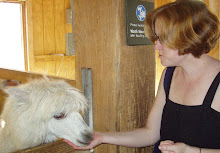Let us begin with beats. I like to think of beats as separate thoughts. Each line of text should have its own thought behind it. For example, the text I am using begins with these words: You're all flops. I am the Earth Mother and you are all flops. One could make the choice to have that contained in one beat- one thought. Of course, that would make for a fairly flat and lazy line reading. The stage directions indicate that Martha is saying this more or less to herself. This is a clue to her need and her thought process.You're all flops. One thought. I am the Earth Mother... I would say that this is one thought and the end of the sentence... and you are all flops... is yet another thought. The circumstance here of extreme drunkenness gives me the freedom to let thoughts clang around noisily in my mind. She isn't thinking too clearly. Here is how I would begin scoring this text- by separating it into beats like this:
You're all flops./ I am the Earth Mother/ and you are all flops./
Looking at that now, I question my need to separate that sentence into two beats. Let's leave it for now and see where the exploration takes us. We can always change it later. My own personal habit is to over-intellectualize this process. I must caution the academic actors out there against obsessing about scoring. If you spend too much time with the text and a pencil and not as much time putting it into your body, you will find yourself disconnected. Kinesthetic performers, however, will benefit from sitting down and understanding the text this way- it will help during those performances when you are not "feeling it". But, I get WAY ahead of myself.
Now that we understand beats, to a certain extent, let's look at objectives. I use the word "objective". Other directors or actors may use terms like "need" or "motivation" or "intention". For all intents and purposes these terms are interchangeable. They all refer to the same thing. I've grown fond of the word "objective", so that is what I use.
Objectives help the actor to understand the interior life of the character. There are two "types" of objectives I will explore in this post, the first is the Super Objective which I define as the driving need behind every action the character takes within the play. The second type is the Beat Objective which refers to the actions/thoughts that happen from moment to moment within the text. All Beat Objectives should be in line with/ reinforce the Super Objective and vice versa. If you find your Beat Objectives contradicting your Super Objective, that should be a red flag for you to explore changing one or both of them. You may just be barking up the wrong tree, so to speak. I can get into that in a bit more detail later. For now we should begin with the Super Objective.
As I said earlier, the Super Objective identifies your character's greatest need within the context of the play. Objectives are framed in the form of a statement of purpose, usually something like this:
I want/ need to...
For example, one could say their character wants to survive, to win, to destroy, to rescue...etc. Objectives should never, never, never be verbs of being. Verbs of being do not give the actor anything to PLAY. Tell me, how can you "be funny" or "be famous" or "be a great lover"? "Be" implies something one just "is" by accident of birth. Using a verb of being will lead to hollow indications and will not inspire you to fill your role. Action verbs (the more colorful the better) will help you to live in your character and will give you direction. Take those same "be" objectives I just cautioned about and turn them into more active verbs. "Be funny" could become "to entertain" or "to fling myself into my performance" or even "to abandon self-consciousness". "Be famous" could become "to claw my way to the top" or "to devour competition" or "to plead for validation/ love/ acceptance". "Be a great lover" could become "to seduce" or "to pleasure" or "to surround myself with love and comfort". See how each active verb gives a completely different picture of a character? Seeking objectives, both beat and super, gives the actor the opportunity to be a writer and the tools with which to practice specificity.
Here's how far we've gotten: One beat = 1 thought. Each beat has its own objective. Each beat objective must, in some way, lead toward the Super Objective which is the character's need throughout the entire play. In my next post I plan to tackle scoring my chosen monologue and discuss the benefits and dangers of scoring. (Okay, dangers is a bit dramatic, but what kind of language do you expect from an actor?) I'd love to write more on this topic, but I have a baby who desperately needs to eat blueberries.
To devour, to consume, to stuff his face with, to celebrate, to enjoy blueberries.


